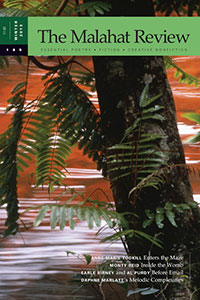Issues
Our Back Pages
Issue #185
Issue Date: December 2013
Editors: John Barton
Pages: 110
Number of contributors: 25
Buy Issue 185: Print Edition

The theme of birth weaves its way through this issue, beginning with Anne Marie Todkill’s short story “The Maze at Traquair,” which chronicles the thoughts of a pregnant woman struggling to come to terms with her relationship and her future. The protagonist winds her way through the story as she does through the titular maze observing her surroundings and her own thoughts. “From these observations a private city emerges for her contemplation,” writes Todkill. The entire narrative invites the reader to observe and take part in intense contemplation as we are given small hints at the deeper meanings behind the characters’ actions.
Immediately after Todkill’s story about a woman on the cusp of giving birth, we come to Monty Reid’s poem “Meditatio Placentae,” a meditation on what it might feel like to be born. In this poem, birth and death intertwine and interchange and ultimately the piece becomes a celebration of the intensity of feeling that comes with life, whatever part of the journey one may be at. Reid’s cutting, short sentences create beauty and wit throughout, as exemplified in the sixth part of the poem, which ends with “Dilate the passage. Curette the pieces. / Spoon-feed the hungry world.”
A couple of Malahat editorial board members and University of Victoria professors make an appearance in this issue. Nicholas Bradley introduces a series of letters between Earle Birney and Al Purdy, the contents of which range from “discussions of style to gossip about the Canadian literary scene to what Purdy called ‘inconsequential yak.’” Later in the issue, another UVic English professor, Eric Miller, contributes a thoughtful book review on Travis V. Mason’s Ornithologies of Desire: Ecocritical Essays, Avian Poetics, and Don McKay.
Other authors of note in issue 185 include Phoebe Wang (who contributes both a poem and a book review), Shane Nielson, Claire Kelly, and Peter Unwin. Unwin’s poem “The Whitsun Wedding” is delightfully dark in its humour, ending with a character who has just slit his own wrists uttering the words “My mother…/Would kill me if she saw this.”
—Rose Morris









